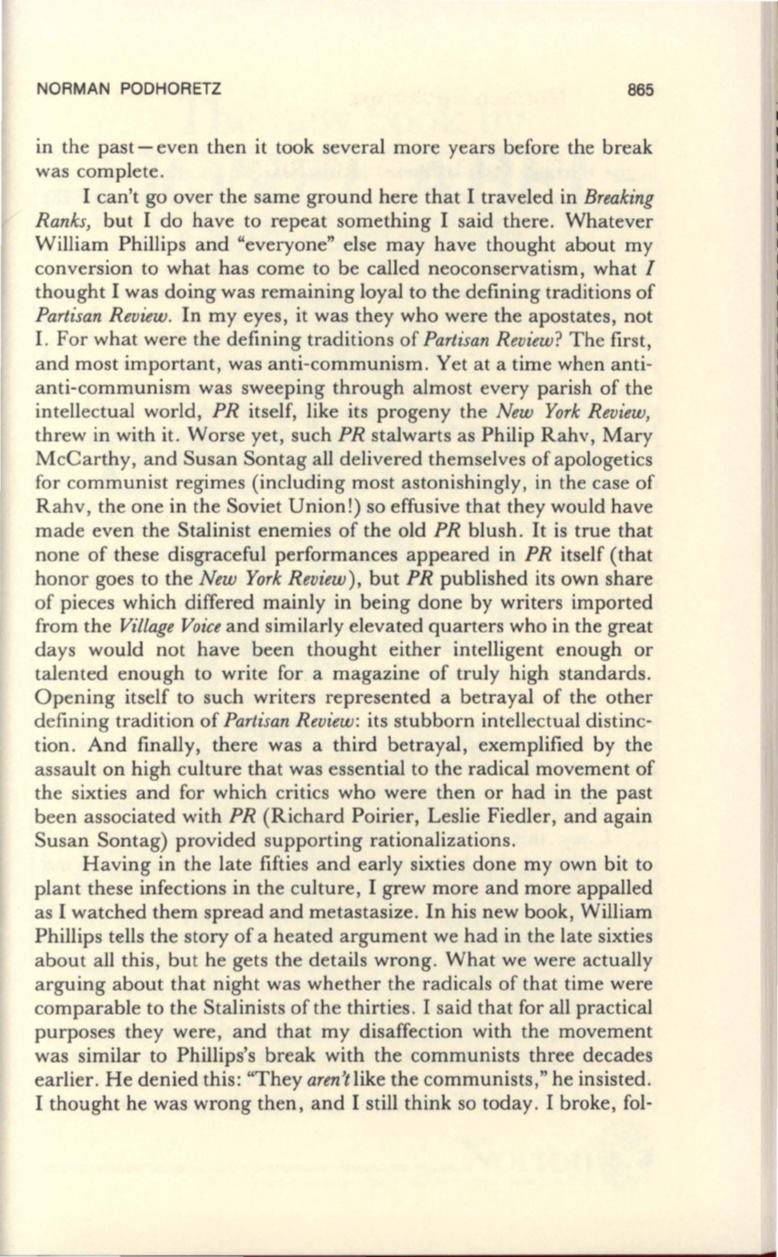
NORMAN PODHORETZ
865
in the past- even then it took several more years before the break
was complete.
I can't go over the same ground here that I traveled in
Breaking
Ranks,
but I do have to repeat something I said there. Whatever
William Phillips and "everyone" else may have thought about my
conversion to what has come to be called neoconservatism, what
I
thought I was doing was remaining loyal to the defining traditions of
Partisan Review.
In my eyes, it was they who were the apostates, not
I.
For what were the defining traditions of
Partisan Review?
The first,
and most important, was anti-communism. Yet at a time when anti–
anti-communism was sweeping through almost every parish of the
intellectual world,
PR
itself, like its progeny the
New York Review,
threw in with it. Worse yet, such
PR
stalwarts as Philip Rahv, Mary
McCarthy, and Susan Sontag all delivered themselves of apologetics
for communist regimes (including most astonishingly, in the case of
Rahv, the one in the Soviet Union!) so effusive that they would have
made even the Stalinist enemies of the old
PR
blush. It is true that
none of these disgraceful performances appeared in
PR
itself (that
honor goes to the
New York Review),
but
PR
published its own share
of pieces which differed mainly in being done by writers imported
from the
Village Voice
and similarly elevated quarters who in the great
days would not have been thought either intelligent enough or
talented enough to write for a magazine of truly high standards .
Opening itself to such writers represented a betrayal of the other
defining tradition of
Partisan Review:
its stubborn intellectual distinc–
tion . And finally, there was a third betrayal, exemplified by the
assault on high culture that was essential to the radical movement of
the sixties and for which critics who were then or had in the past
been associated with
PR
(Richard Poirier, Leslie Fiedler, and again
Susan Sontag) provided supporting rationalizations.
Having in the late fifties and early sixties done my own bit to
plant these infections in the culture, I grew more and more appalled
as I watched them spread and metastasize. In his new book, William
Phillips tells the story of a heated argument we had in the late sixties
about all this, but he gets the details wrong. What we were actually
arguing about that night was whether the radicals of that time were
comparable to the Stalinists of the thirties. I said that for all practical
purposes they were, and that my disaffection with the movement
was similar to Phillips's break with the communists three decades
earlier. He denied this: "They
aren't
like the communists," he insisted.
I thought he was wrong then, and I still think so today. I broke, fol-


